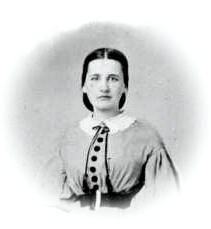September 22nd.—We came over to Portsmouth yesterday on a large steamer. We reached here in the afternoon and as soon as the hotel people recognized Grandpa they sent large trays filled with delicious things to eat as a compliment to him. I forgot to tell that the people everywhere know Grandpa and show him so much attention.
We had hardly finished eating when a waiter came with a letter, on a tray. It was an invitation to our party to visit the man-of-war “Pennsylvania”. We went and had a glorious time. The Stars and Stripes were flying and the band playing when the small boat we were in drew up to the vessel’s side. At a word from the captain, they began to play, “All hail to the Chief.” Father says that is because Grandpa was once Secretary of the Navy.
The Captain had his men show us all over the vessel, we drank some water, which had been in the casks for twenty years, we saw the shining weapons which hung ready for use and we felt very proud of this great ship. The captain invited us to come aboard after supper and have a dance and the young ladies in the party would have liked it but Grandpa did not accept.
I am writing this on the train for Enfield and must stop to see the Roanoke River.
Susan Bradford was 11 years old when this 1857 entry was made. The Bradford family, now visiting Virginia, has been away from Florida since early summer. Susan’s maternal grandfather, John Branch, had served as U.S. Senator, Secretary of the Navy, the 19th Governor of the state of North Carolina, and the sixth and last territorial governor of Florida.
USS Pennsylvania was a three-decked ship of the line of the United States Navy, rated at 130 guns, and named for the state of Pennsylvania. She was the largest United States sailing warship ever built, the equivalent of a first-rate of the British Royal Navy. Authorized in 1816 and launched in 1837, her only cruise was a single trip from Delaware Bay through Chesapeake Bay to the Norfolk Navy Yard. The ship became a receiving ship, and during the Civil War was destroyed. (Wikipedia)
Diary entries from before 1860 are included when the content is relevant to the issues that led to or framed the American Civil War. — MpG 5/22/2020
